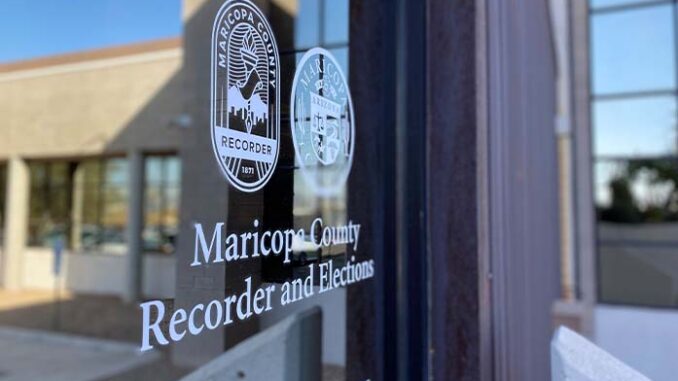
This week Abe Hamadeh filed a new legal briefing to a Mohave County judge on why the Attorney General candidate is entitled to a new trial in his election challenge against Kris Mayes.
And the filing hits hard on the conduct of then-Arizona Secretary of State Katie Hobbs and her staff during the first trial.
Much of Hamadeh’s April 4 filing to Judge Lee Jantzen is aimed at the fact Hobbs withheld evidence in Hamadeh’s case about problems with the Pinal County tabulation that were not discovered until a statutory recount by all 15 counties triggered by the fact only 511 votes separated Hamadeh and Mayes when the 2022 General Election results were formally certified by Hobbs in early December.
Hamadeh, the Republican nominee, initiated an election challenge in Mohave County Superior Court, citing myriad issues he believed led to ballots not being properly counted. Jantzen presided over a trial on the matter Dec. 23, which ended with Hamadeh’s claims being denied due to a “lack” of sufficient evidence.
But on Dec. 29, an attorney for Hobbs as well as her top elections staffer presented the statewide recount results to a Maricopa County judge. It showed Hamadeh at only 280 votes behind Mayes.
It also showed Hobbs knew prior to trial that Hamadeh’s vote count was initially underreported by Pinal County officials. Hamadeh then filed a motion for a new trial.
“Secretary Hobbs was aware at trial that the recount confirmed tabulators had misread validly cast votes as undervotes – votes that were mistakenly excluded from the official canvass,” Hamadeh’s filing states. “Critically, Plaintiffs litigated that precise issue at trial while Secretary Hobbs kept this critical finding under lock-and-key.”
Hobbs has been replaced as a defendant in Hamadeh’s election challenge case by Adrian Fontes, the new Secretary of State. In court filings, Fontes has argued state law prohibited Hobbs from disclosing any information from the recount process until the official results were announced.
It is a position Hamadeh and his legal team resoundingly reject in the latest filing.
“Secretary Fontes argues that his predecessor, Secretary Hobbs, was simply complying with a court order when she withheld material evidence to this case,” the filing states. “Defendants’ suggestion the Secretary was judicially prohibited from disclosing this critical revelation until after the trial is, at best, disingenuous.”
The Secretary of State’s Office is not the only defendant Hamadeh has called out for failing to timely disclose information relevant to his election challenge against Mayes.
According to Hamadeh’s filing, Maricopa County Stephen Richer withheld requested provisional ballot information until eight days after trial, despite the fact the public record was “electronically stored, readily accessible, and available to Maricopa County as soon as the election was canvassed” weeks earlier.
The April 4 filing also suggests Fontes, a Democrat, has allowed partisan considerations to slant his response to Hamadeh’s election challenge.
“Secretary Fontes is Arizona’s Chief Elections Officer for purposes of the National Voter Registration Act and the Help America Vote Act…federal Acts passed, in part, to prevent erroneous disenfranchisement,” the filing states. “Yet Secretary Fontes suggests that this Court should not consider the withheld evidence, even if it not only proves voters were erroneously disenfranchised, but that Hamadeh in fact received the most votes.”
Hamadeh’s filing also announces that his legal team is dropping one of the arguments put forth as a basis for a new trial. It involves concerns with how Maricopa County conducted signature verification of early ballots, a claim “virtually identical” to the claim recently ruled on by the Arizona Supreme Court in Kari Lake’s gubernatorial election challenge against Hobbs.
“Plaintiffs do not believe that Count V is necessary to prove Abraham Hamadeh received the most votes for Attorney General and for the sake of conserving judicial resources, Plaintiffs withdraw their request to have this Court reconsider its non-final order dismissing that claim on laches grounds,” the filing states.
For her part, Mayes has argued that Jantzen should deny Hamadeh’s motion for a new trial.
Jantzen has not yet announced whether he will want to hear oral arguments in support of the myriad written briefs. The judge has 60 days to rule on a pending motion, although a much quicker decision is expected.
Several other motions have been pending before Jantzen for weeks in the Hamadeh case. One involves whether the judge will accept an amicus curiae (friends of the court) brief filed by Senate President Warren Petersen and House Speaker Ben Toma.
Another outstanding motion involves a request by some parties for attorney’s fees against Hamadeh. The others deal with how much money is owed to people who assisted in the inspection of ballots prior to the Dec. 23 trial.
READ MORE:
Mayes, Fontes Oppose New Trial As Hamadeh Focuses On Evidence Hobbs Kept From Judge
